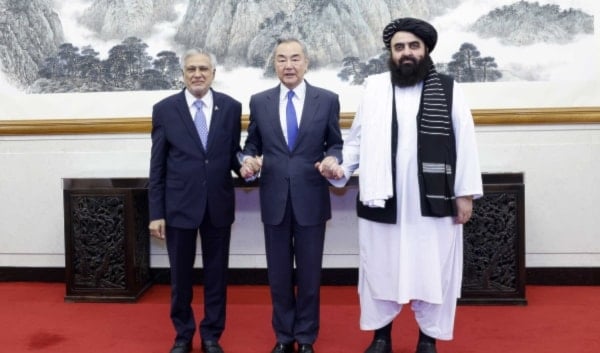China backs Afghan recovery, eyes CPEC expansion into region
A major focus of the talks was the potential extension of the China-Pakistan Economic Corridor (CPEC) into Afghanistan, an initiative seen as essential for enhancing regional connectivity.
-

On May 21, 2025, Member of the Political Bureau of the CPC Central Committee and Foreign Minister Wang Yi chaired an informal trilateral meeting of foreign ministers of China, Afghanistan and Pakistan in Beijing (@Chinamission2un)
China on Wednesday reiterated its long-term commitment to Afghanistan's recovery and development during a trilateral diplomatic meeting in Beijing on Wednesday, where Foreign Minister Wang Yi welcomed acting Afghan Foreign Minister Amir Khan Muttaki and Pakistani Foreign Minister Ishaq Dar for informal talks.
In his remarks, Wang underscored Beijing's intention to remain a key partner in Afghanistan's post-conflict reconstruction. "China attaches great importance to advancing key cooperation projects between China and Afghanistan and consistently supports its recovery and development," he said.
The three sides discussed a broad spectrum of collaboration, including trade, agriculture, energy, mining, law enforcement, and humanitarian fields such as education, healthcare, and disaster preparedness.
"We will import more high-quality Afghan goods and do what we can to support Afghanistan's recovery and development while improving living conditions," Wang stated.
On May 21, 2025, Member of the Political Bureau of the CPC Central Committee and Foreign Minister Wang Yi chaired an informal trilateral meeting of foreign ministers of China, Afghanistan and Pakistan in Beijing. Deputy Prime Minister and Foreign Minister Mohammad Ishaq Dar of… pic.twitter.com/YtFVAR5VIW
— Chinese Mission to UN (@Chinamission2un) May 21, 2025
Beyond economic pledges, the meeting served to further institutionalize cooperation through the China-Afghanistan-Pakistan Trilateral Foreign Ministers' Dialogue, which the parties agreed to convene again in Kabul at an early date. They also expressed willingness to exchange ambassadors to elevate diplomatic representation.
A major focus of the talks was the potential extension of the China-Pakistan Economic Corridor (CPEC) into Afghanistan, an initiative seen as essential for enhancing regional connectivity. This move aligns with China's Belt and Road Initiative, which envisions Afghanistan as a central link in connecting Central Asia to South Asia through infrastructure, trade, and investment.
Read more: Russia, Afghanistan talk rare-earth metals cooperation
According to China's Foreign Ministry, the three countries explored mechanisms to unlock the full potential of their trilateral framework and advance mutually beneficial development.
Wang reaffirmed China's support for both Afghanistan and Pakistan in choosing their own development paths, noting stability and cooperation over external interference.
Slow Recovery
These diplomatic developments coincide with internal initiatives in Afghanistan aimed at asserting the Taliban's administrative control. On April 5, the Taliban government announced the completion of 370 infrastructure-focused development projects over the past year, funded entirely by domestic revenues. While the projects reportedly generated thousands of jobs, many Afghan citizens remain skeptical amid widespread poverty and unemployment. According to the UN, over half the country's population still requires urgent humanitarian aid.
Despite continued international non-recognition and heavy Western sanctions, the Taliban have expanded ties with regional powers like China and Iran. Russia, through trade, fuel supply, and now diplomatic normalization, has emerged as one of the most openly engaged actors, a position that could signal a broader shift in Eurasian geopolitics.

 3 Min Read
3 Min Read










